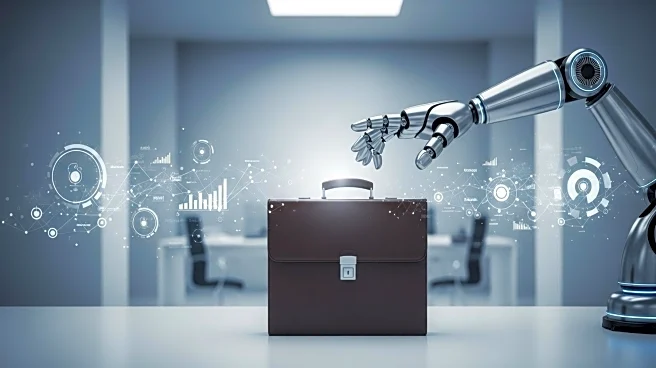What is the story about?
What's Happening?
Artificial intelligence (AI) is set to significantly disrupt the job market, with certain roles facing radical transformation. According to a report by Indeed, approximately 26% of jobs listed on their platform over the past year are susceptible to major changes due to generative AI (gen AI). Gen AI, which includes technologies like OpenAI's ChatGPT and Google's Gemini, can create content such as text, images, and software code, mimicking human cognitive abilities. Jobs in technology and finance, which rely heavily on cognitive reasoning, are particularly vulnerable. Conversely, roles requiring physical labor or human interaction, such as nursing and manufacturing, are less likely to be affected. A Pew Research Center study from 2023 indicates that 19% of American workers are in jobs most exposed to AI, where their primary tasks could be replaced or assisted by AI.
Why It's Important?
The potential transformation of the job market by AI has significant implications for various sectors. White-collar jobs, particularly those in higher-paying fields requiring analytical skills, are at risk of being transformed. This could lead to a shift in the demand for certain skills and potentially result in job displacement for those unable to adapt. Companies like Accenture and Salesforce have already indicated workforce reductions due to AI advancements. However, the overall impact remains speculative, as a Yale University Budget Lab report suggests that the broader labor market has not yet experienced significant disruption. The debate continues on whether AI will primarily augment human jobs, enhancing productivity, or automate them, leading to obsolescence.
What's Next?
As AI technology continues to evolve, businesses and workers will need to adapt to the changing landscape. Companies may increasingly integrate AI into their operations, potentially leading to further job transformations. Workers in at-risk roles may need to reskill or upskill to remain competitive. The ongoing development of agentic AI, which can perform tasks on behalf of users, could further influence job roles, particularly in customer service and information-related fields. The future of AI in the job market will likely involve a combination of augmentation and automation, with industries adopting hybrid models where humans and AI coexist.
Beyond the Headlines
The ethical and societal implications of AI's impact on the job market are significant. As AI technology advances, questions about job security, income inequality, and the future of work will become increasingly important. Policymakers and industry leaders will need to address these challenges to ensure a balanced and equitable transition. Additionally, the potential for AI to produce inaccurate work, known as 'hallucination,' highlights the need for continued oversight and regulation to prevent negative outcomes.
















